Overview
The article delineates the systematic process for conducting feasibility studies in accordance with Colombian regulations, underscoring the critical role of thorough assessments in determining the viability of research initiatives. It identifies key components such as:
- Regulatory compliance
- Stakeholder engagement
- Best practices
This demonstrates that meticulous planning and adherence to local guidelines are vital for achieving successful outcomes in clinical research within Colombia.
Introduction
In the realm of clinical research, feasibility studies serve as a crucial foundation for success, particularly in the dynamic landscape of Colombia. These systematic evaluations assess the practicality and viability of proposed initiatives, empowering stakeholders to make informed decisions that can significantly mitigate risks and optimize resource allocation.
With a growing medical device market and a regulatory framework designed to facilitate research, Colombia presents unique opportunities for innovative companies. This article delves into the essential components, challenges, and best practices associated with conducting feasibility studies in this region. It highlights how local expertise and stakeholder engagement can dramatically enhance the likelihood of successful clinical trials.
Understanding Feasibility Studies: Definition and Importance
Feasibility analyses serve as crucial systematic assessments that evaluate the practicality and viability of proposed research initiatives. In Colombia, feasibility studies conducted under local regulations play a pivotal role in examining various factors, including market demand, regulatory requirements, and operational capabilities. Their significance is paramount; they empower stakeholders to make informed decisions, mitigate risks, and allocate resources efficiently.
By identifying potential obstacles early in the process, researchers can refine their strategies, ultimately enhancing the likelihood of favorable outcomes in trials.
At bioaccess®, we specialize in comprehensive trial management services, which include studies that assess the availability of suitable patient populations, navigate the regulatory landscape, and address logistical considerations for conducting trials in Colombia. Our services encompass trial setup, obtaining import permits, and project management, ensuring that all critical factors are thoroughly evaluated before progressing to subsequent research stages.
Statistics indicate that involving an average of 8-12 potential researchers during site evaluations can significantly enhance the quality of medical trials. Furthermore, preliminary investigations, a vital component of viability assessments, aid in minimizing risks to validity and guide the planning of adequately powered randomized controlled trials (RCTs).
Expert insights underscore the importance of viability assessments in medical research. Carlson PE, a full-time employee at Pfizer Ltd, India, states, "In a genuine sense, practicality is an investment to guarantee good research." Recognizing practicality as an investment in research quality allows investigators to focus on delivering high-quality trials that meet both scientific and operational standards.
This dual perspective—viewing viability as both an art and a science—ensures that trials are not only scientifically rigorous but also operationally feasible, ultimately leading to higher success rates in trials.
With over 20 years of experience in Medtech, bioaccess® connects innovative companies by providing tailored support in conducting feasibility studies under Colombian regulations. Our expertise in navigating the local regulatory environment, including adherence to INVIMA guidelines, and understanding market dynamics uniquely positions us to assist clients in making informed decisions that enhance the success of their medical studies, contributing to job creation, economic development, and healthcare improvement in the region.
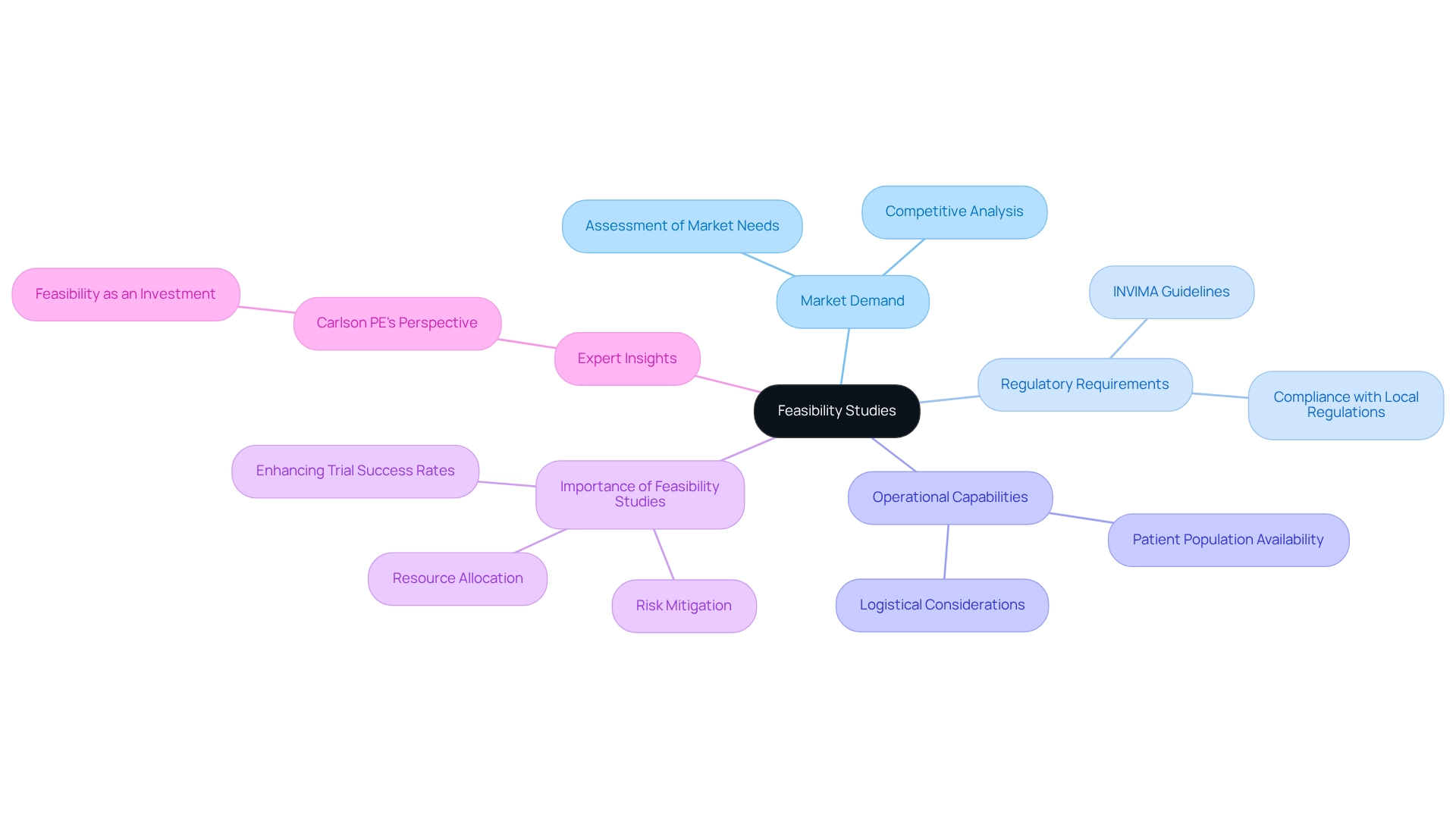
Overview of Colombian Regulations Governing Feasibility Studies
In Colombia, the framework regulating viability assessments for clinical investigations is primarily established by the National Institute for Food and Drug Surveillance (INVIMA) alongside other regulatory agencies. These regulations delineate the essential steps for conducting feasibility studies under Colombian regulations, which encompass the submission of comprehensive protocols, ethical considerations, and strict adherence to local laws. A critical aspect of this process is obtaining ethical approval from Institutional Review Boards (IRBs), which typically takes between four to six weeks for review, underscoring the efficiency of the regulatory process in Colombia.
Additionally, compliance with Good Clinical Practice (GCP) guidelines is mandatory to ensure the integrity and safety of the research.
INVIMA classifies medical devices into various risk categories, significantly influencing their eligibility for first-in-human clinical trials. This classification system is vital for researchers to comprehend, as it directly impacts the regulatory pathway and requirements for conducting feasibility studies under Colombian regulations. For instance, devices classified as higher risk may face more stringent scrutiny and require more extensive documentation.
Furthermore, successful adherence to INVIMA regulations has been demonstrated in various case analyses, particularly those focusing on risk management plans for trials. Sponsors must proactively create these plans to address potential negative occurrences before initiating human trials, thereby enhancing participant safety during first-in-human experiments. As Julio G. Martinez-Clark, CEO of bioaccess, observes, "Colombia’s mix of a large and varied population, experienced research sites, efficient regulatory processes, a cost-effective environment, and a history of successful medtech trials since 2010 render it an appealing option for U.S. medical device firms seeking to carry out research."
In this context, bioaccess™ plays a crucial role in facilitating these processes, as exemplified by its partnership with Avantec Vascular for their first-in-human trial of an innovative vascular device in Latin America. This collaboration highlights bioaccess's extensive management services for trials, which encompass viability assessments, site selection, compliance evaluations, trial preparation, import permits, project oversight, and reporting.
Colombia's regulatory framework, characterized by its efficient processes and a large, diverse population, positions it as an attractive location for conducting research trials. The combination of these elements, along with a history of successful clinical trials since 2010, emphasizes the significance of understanding and adhering to feasibility studies under Colombian regulations for researchers intending to carry out assessments in this region.
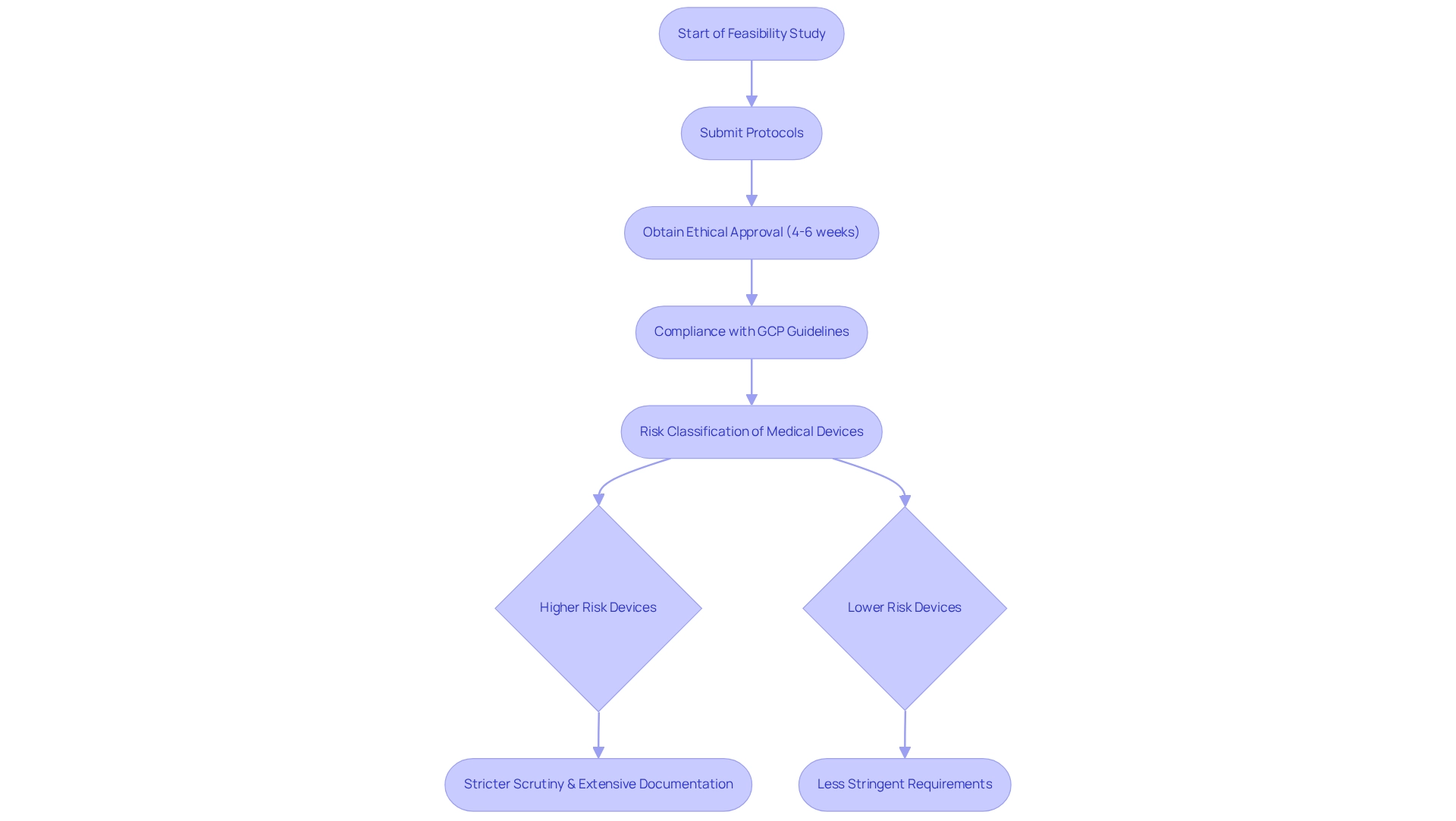
Step-by-Step Process for Conducting Feasibility Studies
Conducting a feasibility study is a systematic process that encompasses several critical steps to ensure its effectiveness and alignment with regulatory standards, particularly in the context of Colombian regulations and the oversight of INVIMA, the National Food and Drug Surveillance Institute.
-
Define Objectives: Begin by clearly outlining the aims of the viability assessment. This includes identifying specific questions that need to be answered, such as the viability of the proposed intervention and its alignment with company objectives. It is crucial to differentiate a feasibility analysis from a project pitch, as the former assesses the project's viability in relation to company goals.
-
Conduct Preliminary Research: Gather existing data on the target population, market conditions, and regulatory requirements. This foundational research is essential for comprehending the environment in which the investigation will operate, particularly regarding the compliance reviews required to meet INVIMA's standards.
-
Engage Stakeholders: Early involvement of key stakeholders is essential. Their insights can offer valuable viewpoints and encourage support for the research, enhancing its credibility and relevance. Input from both interventionists and participants can guide essential adjustments to enhance engagement and adherence, as emphasized in the case analysis titled 'Assessing Intervention Fidelity and Acceptability.'
-
Assess Resources: Evaluate the availability of necessary resources, including funding, personnel, and facilities. Understanding resource limitations can aid in planning and implementing the research efficiently, ensuring that all facets of project management are considered.
-
Develop a Research Protocol: Create a detailed research protocol that outlines the methodology, timelines, and responsibilities. This document serves as a guide for the research, ensuring all team members are aligned on objectives and processes, and it should include considerations for the import permits and nationalization of investigational devices as required by local regulations.
-
Submit for Ethical Approval: Before proceeding, obtain necessary approvals from Institutional Review Boards (IRBs) and regulatory bodies, including ethics committees and health ministries. This step is essential to ensure that the research adheres to ethical standards and regulatory requirements, especially in the case of feasibility studies under Colombian regulations.
-
Examine Information: Gather and evaluate data to determine the practicality of the proposed project. Statistical methods, including confidence intervals, play a vital role in interpreting results. For example, when the sample size is 50, the width of the 95% confidence interval for a correlation coefficient is 0.426, which is significant in small sample analyses. Additionally, it is essential to consider the constraints of non-parametric statistics in small samples, as highlighted in recent discussions on pilot experiments.
-
Report Findings: Compile the results into a comprehensive report that outlines the viability of the project and provides recommendations for moving forward. This report should incorporate insights from stakeholders and data analysis, emphasizing both the strengths and weaknesses of the research.
By following these steps, researchers can ensure that their assessments are thorough, well-structured, and aligned with both regulatory standards and the strategic objectives of their organizations. Optimal methods, including ongoing stakeholder involvement and repetitive feedback cycles, can further improve the quality and influence of the research. As mentioned by Divya Sampark, "I’d have appreciated more comments on projects, but overall, it was a wonderful experience," highlighting the significance of feedback in the evaluation process.
Furthermore, bioaccess provides thorough trial management services, encompassing trial setup, project oversight, and reporting, which are crucial for managing the intricacies of executing assessments in accordance with INVIMA regulations. The effect of Medtech clinical research on local economies, including job creation and healthcare enhancement, further emphasizes the significance of these investigations in promoting international cooperation and economic development.
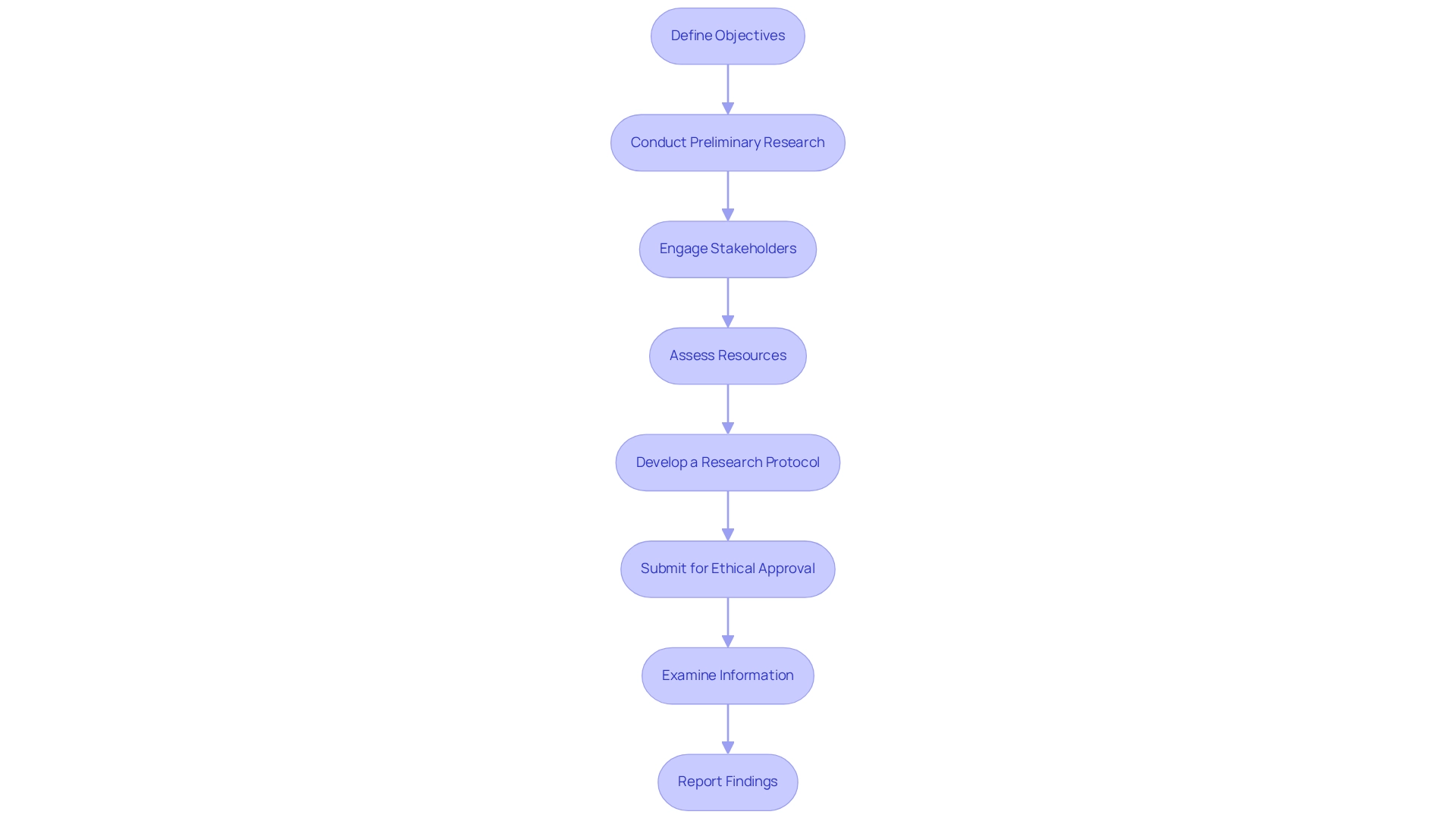
Essential Components of a Feasibility Study in Colombia
A comprehensive feasibility study in Colombia must encompass several essential components to ensure thorough evaluation and compliance with local regulations:
-
Executive Summary: This section provides a brief overview of the research's objectives, methodology, and key findings, setting the stage for the detailed analysis that follows.
-
Market Analysis: A critical assessment of the target market is imperative, including demographic insights, competitive landscape, and potential demand for the medical device or intervention. Colombia's medical device market is expanding, presenting significant opportunities for innovative solutions that meet local needs. Resources for market analysis and trade events, such as the Ministry of Health, Colombia Compra Eficiente, and INVIMA, offer valuable insights and support for conducting this analysis. The collaboration between bioaccess™ and Welwaze Medical Inc. for the Celbrea® medical device launch exemplifies the potential for successful market entry in this burgeoning sector.
-
Technical Feasibility: This component evaluates the technical aspects of the project, encompassing the necessary technology, infrastructure, and expertise required for successful implementation. Understanding the local context and accessible resources is crucial for this analysis, particularly given bioaccess™'s extensive clinical trial management services, which include feasibility assessments, site selection, and project coordination.
-
Financial Analysis: Detailed financial projections are vital, covering costs, funding sources, and potential revenue streams. This analysis should reflect the economic landscape of Colombia, where the medical device outsourcing market is projected to reach USD 1,754.9 million by 2030, indicating a robust environment for investment. Additionally, Argentina's medical device outsourcing market is also projected to reach USD 1,754.9 million by 2030, further reinforcing the argument for investment opportunities in the region.
-
Regulatory Compliance: A dedicated section outlining how the research will adhere to Colombian regulations and ethical standards is essential. The National Drug and Food Regulatory Agency (INVIMA) oversees the registration and regulation of medical devices. Understanding their classification system, which aligns with international standards, can facilitate expedited reviews for lower-risk devices. The case analysis titled 'Regulatory Landscape for Medical Devices in Colombia' illustrates the challenges and processes involved in registering devices with INVIMA, enhancing the reader's understanding of the regulatory environment. Katherine Ruiz, an expert in Regulatory Affairs for medical devices and in vitro diagnostics in Colombia, emphasizes the importance of navigating these regulations effectively, stating, "Understanding the local regulatory landscape is crucial for success in the Colombian market."
-
Risk Assessment: Identifying potential risks and challenges is essential, along with strategies for mitigation. This proactive approach aids in navigating the complexities of the regulatory landscape and market entry. Notably, U.S. companies encounter challenges in the registration process with INVIMA, which can pose barriers for new entrants.
-
Stakeholder Engagement Plan: A clearly outlined plan for stakeholder involvement throughout the research process ensures that all relevant parties are engaged and informed, fostering collaboration and support.
Integrating these elements into feasibility studies under Colombian regulations not only ensures compliance but also enhances the likelihood of successful market entry and product acceptance. By leveraging local resources and understanding the demographics of target populations, researchers can conduct effective market analyses that inform their strategies and decision-making processes. As Alvaro Enrique Rincon Mautner from SPI Americas notes, comprehending the local regulatory landscape is crucial for success in the Colombian market.
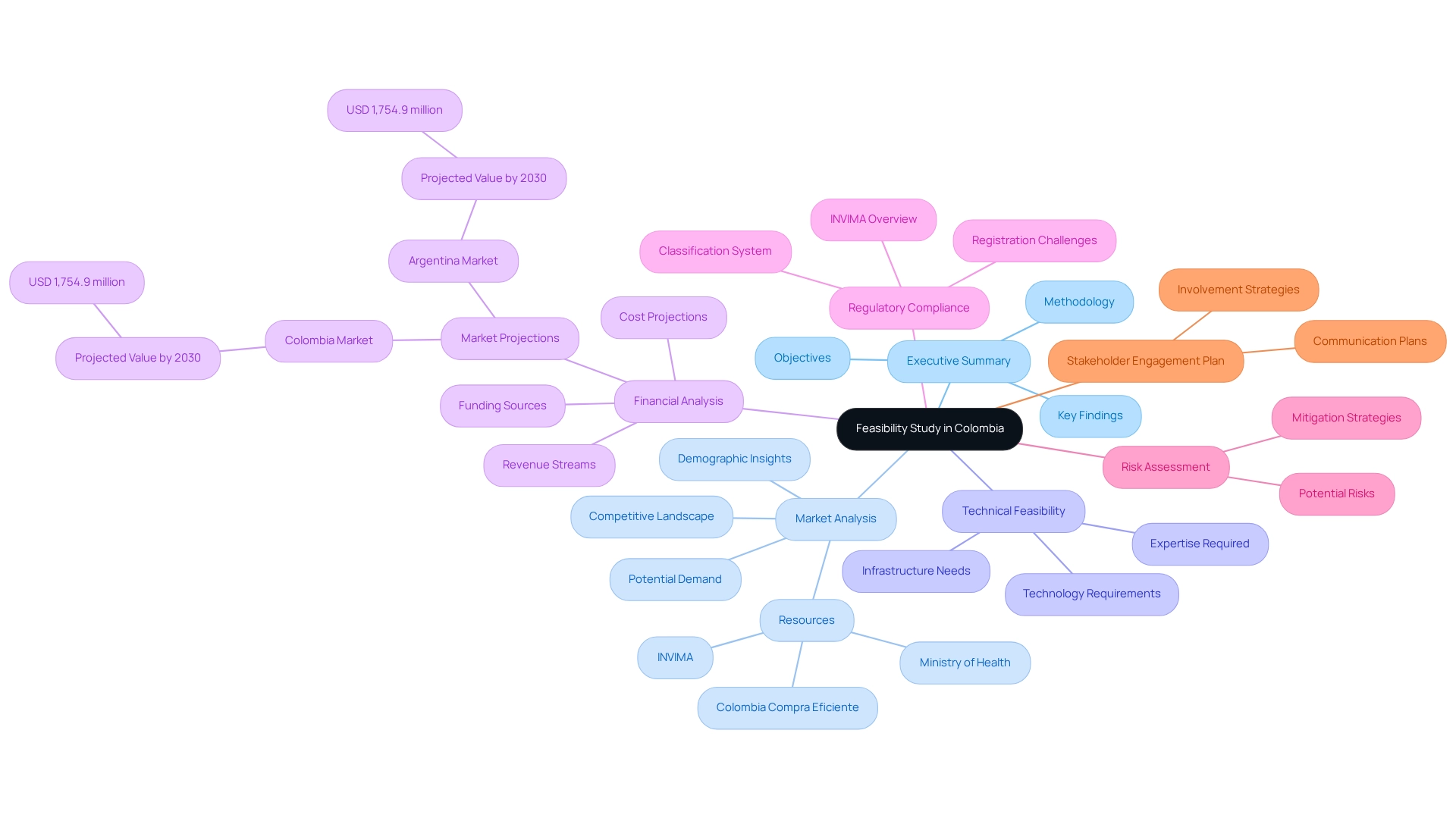
Challenges and Solutions in Conducting Feasibility Studies
Conducting feasibility studies under Colombian regulations presents various obstacles that can significantly impact the success of medical investigation initiatives. Key challenges include:
-
Regulatory Complexity: The intricate regulatory landscape in Colombia can overwhelm researchers. To effectively navigate this complexity, engaging local experts or consultants with a deep understanding of feasibility studies under Colombian regulations is advisable. Their expertise in site selection, compliance reviews, trial setup, import permits, project management, and reporting can streamline the approval process, ensuring adherence to all necessary guidelines. As Ville-Veikko Pulkka observed, government dedication is essential in promoting medical studies, underscoring the significance of comprehending the regulatory landscape.
-
Language Barriers: Communication with stakeholders can be significantly hindered by language differences. To mitigate this issue, employing bilingual team members or utilizing professional translation services is essential. This approach ensures that all parties are aligned, facilitating smoother interactions and a clearer understanding of project requirements.
-
Resource Limitations: Access to funding and skilled personnel can be restricted, presenting a significant obstacle to advancing feasibility assessments. The GINI index, which has shown a gradual rise in inequality, underscores the socioeconomic factors that may influence feasibility studies under Colombian regulations. To address this, researchers should consider forming partnerships with local institutions or organizations that can provide additional resources and support. Such collaborations can enhance the ability to conduct thorough and effective research, leveraging the comprehensive services offered by bioaccess.
-
Cultural Differences: Understanding and respecting local customs and practices is crucial for successful stakeholder engagement. To cultivate improved connections with local stakeholders, implementing cultural competency training for the project team is suggested. This training prepares team members with the understanding and abilities required to navigate cultural subtleties, ultimately resulting in more efficient collaboration.
Furthermore, a case analysis on acceptability and effectiveness outcomes highlights the significance of addressing mental health results in healthcare examination. Participants were evaluated before and after the intervention, demonstrating notable advancements in mental health results such as anxiety and depression. This aligns with the necessity for comprehending local contexts in practical assessments. By proactively tackling these challenges and incorporating insights from outside sources, including the knowledge of experts like Katherine Ruiz and Juan Cuya, MD, researchers can enhance the practicality and effectiveness of their efforts in Colombia, paving the way for successful clinical research outcomes.
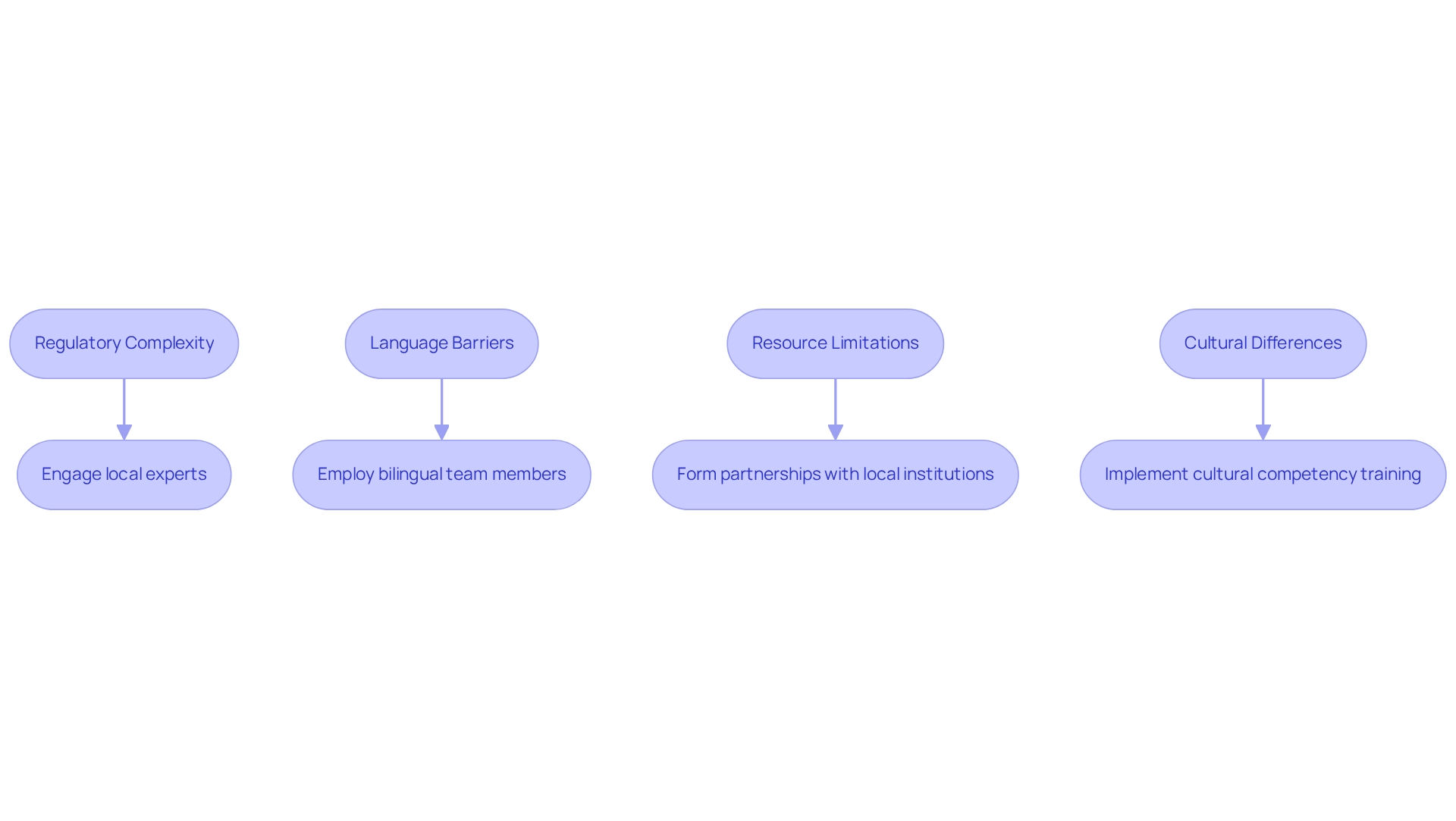
Engaging Stakeholders: A Key to Successful Feasibility Studies
Involving stakeholders is crucial for the success of feasibility assessments, particularly in the evolving environment of Latin American Medtech. Key strategies for effective engagement include:
-
Identify Key Stakeholders: Recognize individuals and groups who will be affected by the research and those who can influence its success. This encompasses regulatory agencies, healthcare providers, and patient advocacy groups, all of which play an essential role in navigating the complexities of research in Latin America.
-
Communicate Early and Often: Establish open lines of communication from the beginning to keep stakeholders informed and actively engaged throughout the research. This proactive approach is vital, as highlighted by bioaccess's collaboration with Caribbean Health Group, which emphasizes the importance of clear communication in positioning Barranquilla as a leading destination for clinical trials in Latin America.
-
Gather Input: Actively solicit feedback from stakeholders during the planning phase. This guarantees their concerns and insights are incorporated into the research design, enhancing its relevance and acceptance. Involving local specialists can greatly enhance the project's alignment with regional needs and regulatory requirements, as mentioned by Steve Garchow in the podcast, where he highlighted the significance of comprehending local market dynamics.
-
Build Relationships: Cultivate trust and collaboration by engaging stakeholders in meaningful ways, such as through workshops, advisory committees, or regular meetings. This method promotes a sense of ownership and dedication to the project's objectives, which is crucial for successful outcomes in the Latin American context.
-
Provide Updates: Regularly inform stakeholders about the project's progress and findings. Keeping them informed not only preserves their support but also fosters continuous participation, which is essential for the project's success. For instance, bioaccess's commitment to transparency has been instrumental in achieving over 50% reduction in recruitment time and 95% retention rates in clinical trials.
Effective stakeholder engagement strategies have been shown to greatly enhance feasibility studies under Colombian regulations and project quality. A recent research titled 'Impact of Partner Engagement on Study Feasibility and Quality' highlighted that 38 partners specified two or more types of impact within their projects, demonstrating the value of collaborative input in enhancing trial design and implementation. As Professor Philip Kotler noted, the contributions of experts in the field are invaluable in shaping effective strategies.
By prioritizing effective communication and stakeholder involvement, investigators can navigate the complexities of medical studies more successfully. At bioaccess®, our knowledge and tailored method in fostering stakeholder involvement are essential in progressing medical devices through efficient clinical methodologies, especially with regard to feasibility studies under Colombian regulations for early viability assessments.
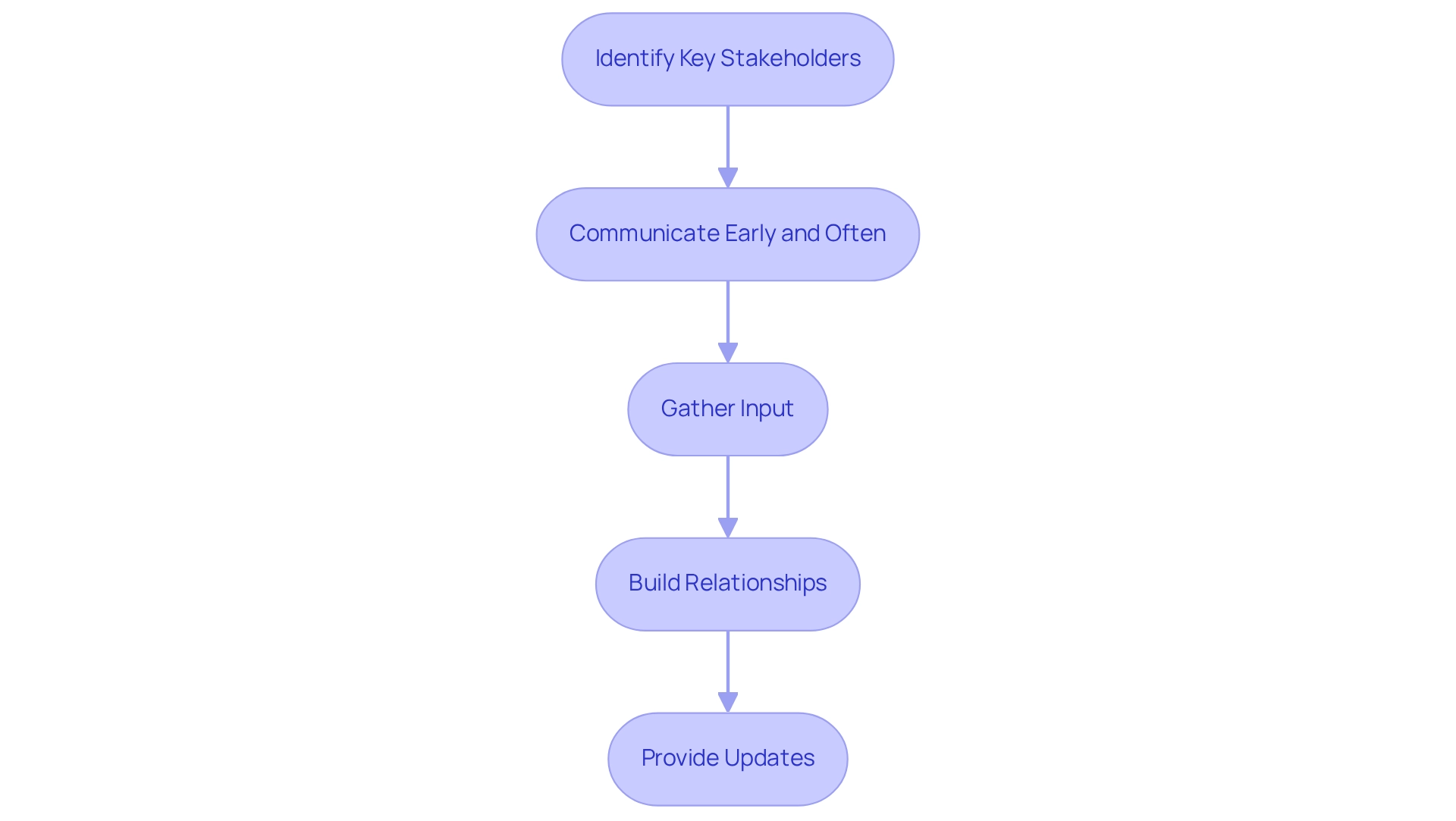
Best Practices for Conducting Feasibility Studies in Colombia
To ensure the success of feasibility studies in Colombia, researchers must adhere to best practices that are foundational to effective clinical research.
-
Thorough Planning: Allocate sufficient time for meticulous planning, which should encompass clear objectives, methodologies, and timelines. This foundational step is crucial, as thorough documentation and planning of resources are fundamental to research success, preventing issues such as poor recruitment and adherence. A case analysis titled "Resource Assessment for RCT Implementation" highlights how neglecting these factors could lead to poor outcomes, emphasizing the need for careful logistical considerations. As industry experts note, a well-structured plan can significantly enhance the likelihood of successful market access in the region.
-
Utilize Local Expertise: Collaborate with local researchers and institutions to tap into their extensive knowledge of the regulatory landscape and cultural nuances. Involving local specialists greatly improves the relevance and effectiveness of feasibility studies under Colombian regulations, ensuring compliance. This approach aligns with insights shared by Steve Garchow, who emphasizes the importance of local knowledge in navigating the complexities of the Latin American Medtech market. At bioaccess, we prioritize local partnerships to ensure our research is culturally and contextually relevant.
-
Maintain Flexibility: Be prepared to adapt the study design and approach in response to feedback and unforeseen challenges. Flexibility is essential in managing the intricacies of research in healthcare, enabling modifications that can result in better outcomes. This adaptability is crucial in a dynamic regulatory environment, as highlighted by the experiences of professionals in the field.
-
Document Everything: Maintain comprehensive records of all processes, decisions, and communications. This practice ensures transparency and accountability while facilitating smoother regulatory reviews and audits. Thorough documentation is essential for compliance with INVIMA regulations and can streamline the approval process for clinical trials. At bioaccess, we emphasize meticulous documentation as part of our trial setup and project management services.
-
Conduct Pilot Experiments: Whenever feasible, execute small-scale pilot experiments to evaluate methodologies and collect initial data. As Linda Tickle-Degnen points out, "A pilot investigation is a version of the main research that is conducted on a smaller scale to determine if the elements of the primary investigation can all function together." This method enables researchers to evaluate if all elements can function together efficiently before proceeding with a comprehensive assessment. Furthermore, pilot assessments offer valuable insights into participant involvement and compliance, which are essential for assessing program effectiveness.
By adhering to these best practices, researchers can improve the chances of successful assessments, including feasibility studies under Colombian regulations, ultimately aiding the progress of medical technologies in the region. For instance, consider a consumer goods company conducting a feasibility assessment for a new product line, evaluating market interest, technological requirements, financial forecasts, organizational preparedness, and legal conformity, ultimately opting to move forward with the project. Additionally, monitoring participant adherence and involvement in intervention components is crucial for assessing program effectiveness, ensuring that the research meets its objectives.
At bioaccess, we are committed to facilitating these processes through our comprehensive clinical trial management services.
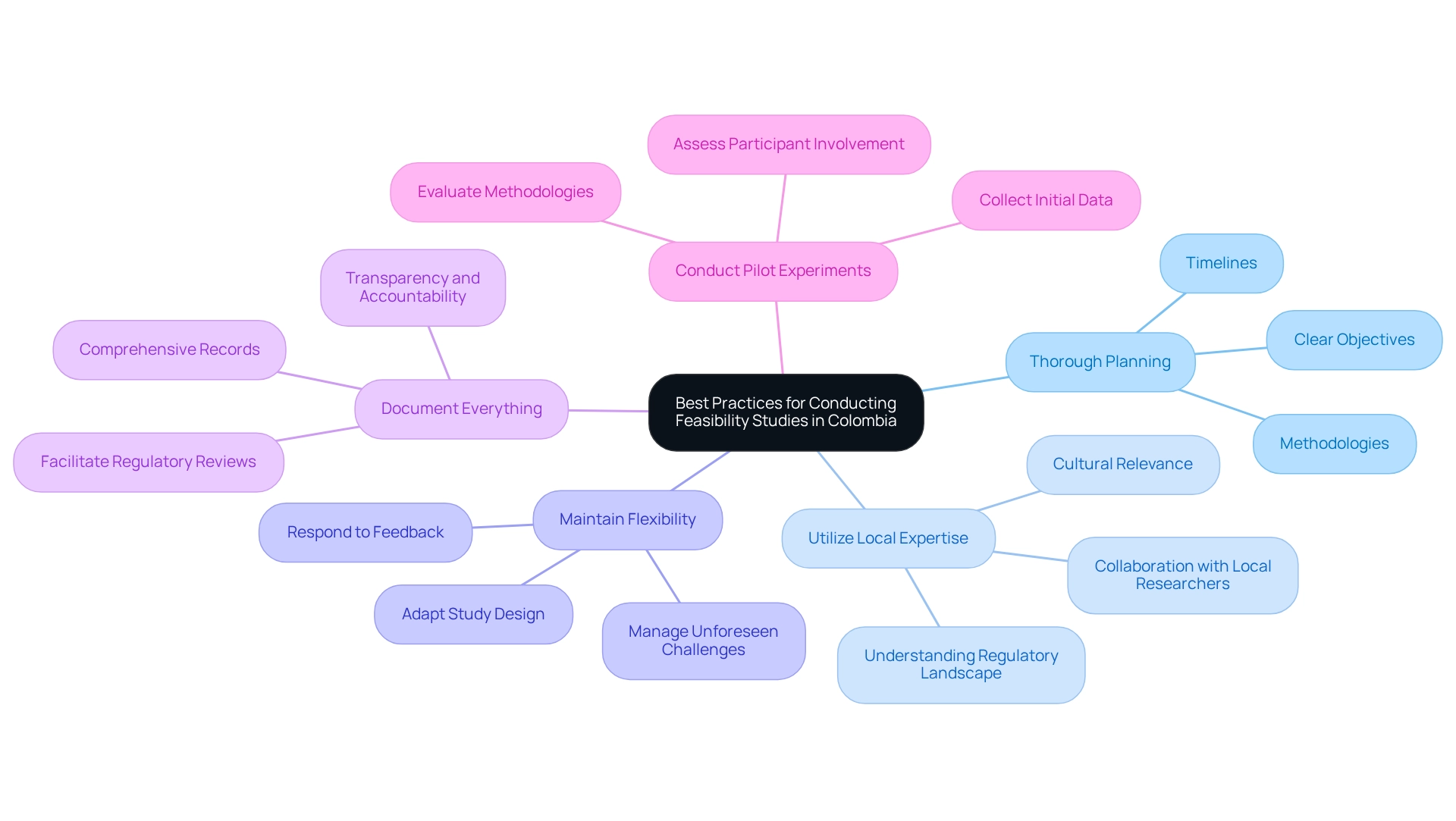
Post-Study Evaluation: Assessing the Impact of Feasibility Studies
Post-examination assessments are pivotal in comprehending the effects of viability analyses, such as ReGelTec's Early Viability Analysis on HYDRAFIL™ for treating chronic low back pain in Colombia. Researchers must undertake the following steps to ensure thorough evaluation and improvement:
-
Analyze Outcomes: Conduct a comprehensive review of the feasibility assessment results in relation to the initial objectives. This evaluation is essential for recognizing both achievements and areas necessitating enhancement, providing a clear perspective on the project's effectiveness. It is vital to consider factors such as effect modification and confounding, as these can significantly impact the interpretation of results.
-
Gather Feedback: Actively solicit feedback from all stakeholders and participants. Their insights are invaluable for understanding experiences and perceptions, which can illuminate strengths and weaknesses in the research's design and execution. The collaboration between bioaccess and GlobalCare Clinical Trials exemplifies how partnerships can enhance clinical trial services, achieving over 50% reductions in recruitment time and 95% retention rates.
-
Document Lessons Learned: Compile a comprehensive report that details the lessons learned throughout the study. This report should encompass both achievements and obstacles faced, serving as an essential resource for future projects. For instance, the "Needle-Stick Injury Incidence Study" provided insights into the frequency and causes of needle-stick injuries, guiding strategies to improve safety protocols in healthcare environments.
-
Share Results: Distribute findings to stakeholders and the wider academic community. Exchanging insights enhances shared knowledge and optimal practices, fostering a culture of teamwork and ongoing enhancement in clinical studies. As Dr. Dave Nicholas observed, the contributions of various specialists are crucial in developing robust investigative methodologies.
-
Plan for Future Research: Utilize insights gained from the evaluation to inform the design and execution of subsequent viability assessments. This iterative process ensures that each analysis builds on lessons learned, enhancing the overall quality and impact of future inquiries. Employing suitable statistical techniques, such as the Cox proportional hazards model, is essential for accurately analyzing feasibility studies under Colombian regulations and ensuring reliable conclusions. Furthermore, the impact of medtech clinical studies extends beyond research, contributing to local economies through job creation, economic growth, and healthcare improvement.
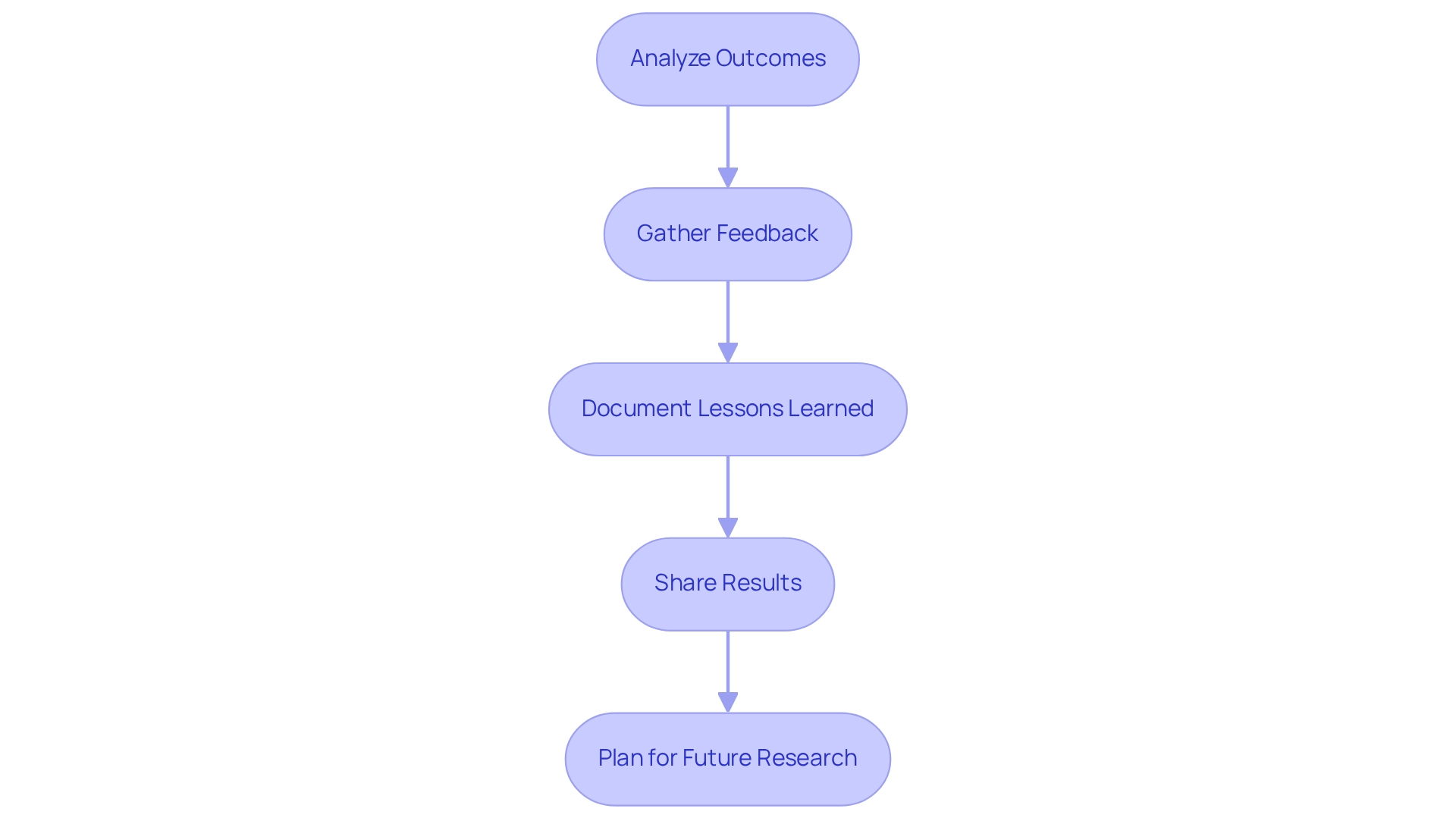
Conclusion
Conducting feasibility studies in Colombia represents a multifaceted process that demands meticulous attention to various components, ranging from regulatory compliance to stakeholder engagement. This article has underscored the essential steps involved, including:
- Definition of objectives
- Stakeholder engagement
- Resource assessment
All critical for ensuring the study's success. By emphasizing local expertise and comprehending market dynamics, the likelihood of favorable outcomes in clinical trials is further enhanced.
Beyond the practical steps, the significance of perceiving feasibility studies as an investment in quality cannot be overstated. By acknowledging their role in risk mitigation and resource optimization, researchers can adeptly navigate the complexities inherent in the Colombian clinical research landscape. The regulatory framework established by INVIMA, in conjunction with the burgeoning medical device market, positions Colombia as an appealing destination for innovative companies intent on conducting clinical research.
Ultimately, the insights derived from feasibility studies not only bolster the chances of successful trials but also yield broader benefits, including job creation and advancements in healthcare within the region. As the clinical research landscape continues to evolve, embracing best practices and nurturing collaborative relationships will be pivotal in unlocking the full potential of medical innovation in Colombia. By prioritizing these elements, stakeholders can ensure that their initiatives are not only viable but also impactful in propelling progress within the healthcare sector.
Frequently Asked Questions
What is the purpose of feasibility analyses in research?
Feasibility analyses evaluate the practicality and viability of proposed research initiatives, helping stakeholders make informed decisions, mitigate risks, and allocate resources efficiently.
Why are feasibility studies important in Colombia?
In Colombia, feasibility studies are crucial for examining market demand, regulatory requirements, and operational capabilities, which ultimately enhance the likelihood of favorable outcomes in trials.
What services does bioaccess® provide in relation to trial management?
Bioaccess® offers comprehensive trial management services, including feasibility studies, trial setup, obtaining import permits, and project management, ensuring thorough evaluation of critical factors before progressing to subsequent research stages.
How does involving multiple researchers during site evaluations impact medical trials?
Involving an average of 8-12 potential researchers during site evaluations can significantly enhance the quality of medical trials.
What role do preliminary investigations play in viability assessments?
Preliminary investigations help minimize risks to validity and guide the planning of adequately powered randomized controlled trials (RCTs).
What is the significance of practicality in research, according to expert insights?
Practicality is viewed as an investment in research quality, allowing investigators to focus on delivering high-quality trials that meet both scientific and operational standards.
How does Colombia's regulatory framework support feasibility assessments?
The framework, primarily established by INVIMA and other regulatory agencies, outlines essential steps for conducting feasibility studies, including ethical approvals and compliance with Good Clinical Practice (GCP) guidelines.
What is the typical duration for obtaining ethical approval from Institutional Review Boards (IRBs) in Colombia?
The review process for obtaining ethical approval typically takes between four to six weeks.
How does INVIMA classify medical devices, and why is this important?
INVIMA classifies medical devices into various risk categories, which significantly influences their eligibility for first-in-human clinical trials, impacting the regulatory pathway and requirements for conducting feasibility studies.
What is the significance of risk management plans in clinical trials?
Sponsors must proactively create risk management plans to address potential negative occurrences before initiating human trials, which enhances participant safety during first-in-human experiments.
Why is Colombia considered an attractive location for conducting research trials?
Colombia offers a large and varied population, experienced research sites, efficient regulatory processes, a cost-effective environment, and a history of successful medtech trials, making it appealing for U.S. medical device firms.
What specific role does bioaccess® play in facilitating clinical trials in Colombia?
Bioaccess® facilitates the trial process by providing management services that include viability assessments, site selection, compliance evaluations, trial preparation, import permits, project oversight, and reporting.

